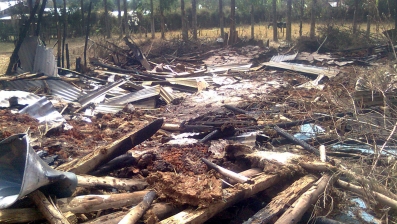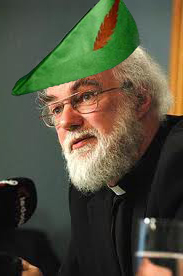In much the same way as Leo Tolstoy, Gandhi promoted non-violence as a panacea for all strife, both personal and political. Although as a Christian it is easy to sympathise with the former, Gandhi’s formula only worked against the British Raj because, by the time Gandhi applied it, it also had little appetite for sustained violence.
The advice he gave to Jews, – a single Jew standing up and refusing to bow to Hitler’s decrees might be enough to melt Hitler’s heart – is nothing less than the fevered raving of a deranged mind.
It comes as no surprise, then, that a new biography of Gandhi reveals that his sexual antics were no less fevered and deranged.
No wonder Bishop Michael Ingham holds Gandhi up as a archetype worthy of emulation.
From here:
Gandhi’s pejorative reference to nakedness is ironic considering that, as Mr. Lelyveld details, when he was in his 70s and close to leading India to independence, he encouraged his 17-year-old great-niece, Manu, to be naked during her “nightly cuddles” with him. After sacking several long-standing and loyal members of his 100-strong personal entourage who might disapprove of this part of his spiritual quest, Gandhi began sleeping naked with Manu and other young women. He told a woman on one occasion: “Despite my best efforts, the organ remained aroused. It was an altogether strange and shameful experience.”
Yet he could also be vicious to Manu, whom he on one occasion forced to walk through a thick jungle where sexual assaults had occurred in order for her to retrieve a pumice stone that he liked to use on his feet. When she returned in tears, Gandhi “cackled” with laughter at her and said: “If some ruffian had carried you off and you had met your death courageously, my heart would have danced with joy.”
Yet as Mr. Lelyveld makes abundantly clear, Gandhi’s organ probably only rarely became aroused with his naked young ladies, because the love of his life was a German-Jewish architect and bodybuilder, Hermann Kallenbach, for whom Gandhi left his wife in 1908. “Your portrait (the only one) stands on my mantelpiece in my bedroom,” he wrote to Kallenbach. “The mantelpiece is opposite to the bed.” For some reason, cotton wool and Vaseline were “a constant reminder” of Kallenbach, which Mr. Lelyveld believes might relate to the enemas Gandhi gave himself, although there could be other, less generous, explanations.
Gandhi wrote to Kallenbach about “how completely you have taken possession of my body. This is slavery with a vengeance.” Gandhi nicknamed himself “Upper House” and Kallenbach “Lower House,” and he made Lower House promise not to “look lustfully upon any woman.” The two then pledged “more love, and yet more love . . . such love as they hope the world has not yet seen.”




